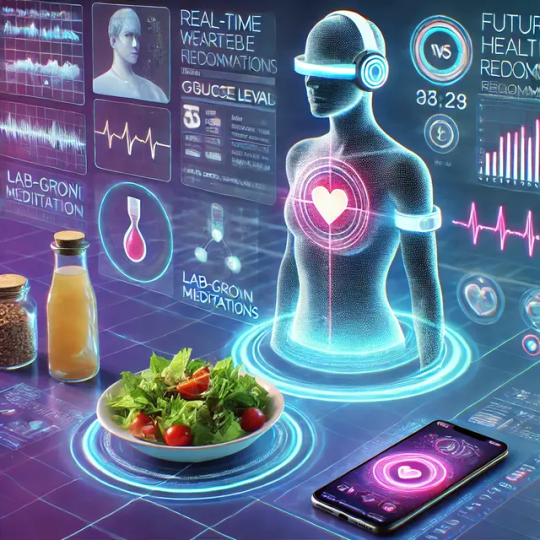#AI Healthcare
Explore tagged Tumblr posts
Text
#best online course in india#biotechnology online courses#online certificate courses#free online courses with certificates#medical lab technician#online pharmacy course#biotechnology courses#ai healthcare
3 notes
·
View notes
Text
The Impact of AI on Everyday Life: A New Normal
The impact of AI on everyday life has become a focal point for discussions among tech enthusiasts, policymakers, and the general public alike. This transformative force is reshaping the way we live, work, and interact with the world around us, making its influence felt across various domains of our daily existence. Revolutionizing Workplaces One of the most significant arenas where the impact…

View On WordPress
#adaptive learning#AI accessibility#AI adaptation#AI advancements#AI algorithms#AI applications#AI automation#AI benefits#AI capability#AI challenges#AI collaboration#AI convenience#AI data analysis#AI debate#AI decision-making#AI design#AI diagnostics#AI discussion#AI education#AI efficiency#AI engineering#AI enhancement#AI environment#AI ethics#AI experience#AI future#AI governance#AI healthcare#AI impact#AI implications
1 note
·
View note
Text
AI Nurses Challenge Healthcare's Human Touch
The healthcare industry is undergoing a seismic shift as artificial intelligence (AI) continues to make inroads into hospital care. From monitoring patient vitals to providing 24/7 support, AI-powered tools like Ana, a virtual assistant developed by Hippocratic AI, are transforming how medical services are delivered. However, this technological revolution is not without controversy, as human…
#ai#AI Healthcare#AI in healthcare#AI Nurses#artificial-intelligence#future of healthcare#health#Healthcare#healthcare technology#Hippocratic AI#hospital care#National Nurses United#nurse burnout#Nurses#nurses burnout#nursing unions#Patient safety#technology
0 notes
Text
Tempus Announces Acquisition of Deep 6 AI
Deep 6 is integrated with over 750 provider site locations spanning more than 30 million patients, which will materially add to Tempus’ existing network Press Release – Tempus AI, Inc. (NASDAQ: TEM), a technology company leading the adoption of AI to advance precision medicine and patient care, today announced it has acquired Deep 6 AI, a leading AI-powered precision research platform for…
1 note
·
View note
Text
The Future of Pharmaceutical Companies: Innovations, Trends, and Consumer Insights
Table of Contents Introduction The Role of AI in Pharmaceuticals Key Trends Shaping the Industry How to Choose the Right Pharmaceutical Products AI Overview: Smart Drug Discovery and Development Featured Snippets & AEO Optimization for Pharma GEO Targeting for Local and Global Reach FAQs About Pharmaceutical Industry People Also Ask (PAA) People Also Search (PAS) Case Studies:…
#ai#AI drug trials#AI healthcare#AI in pharma#artificial-intelligence#big data in healthcare#Biotechnology#clinical research#digital health#drug development#drug safety#FDA approval#health#healthcare#healthcare revolution#healthcare technology#medical breakthroughs#medical technology#patient care#personalized medicine#pharma business#pharma future#pharma innovation#pharma marketing#pharma regulations#pharmaceutical trends#regenerative medicine#smart drug discovery#technology#telemedicine
0 notes
Text
Revolutionizing Healthcare with AI-Powered Predictive Analytics

Introduction
Artificial intelligence (AI) is transforming the healthcare industry by enabling predictive analytics that help anticipate potential health risks. AI-driven models analyze vast amounts of medical data, providing actionable insights that enhance decision-making for medical professionals. By leveraging AI-powered insights, healthcare providers can move from reactive treatment approaches to proactive care strategies.
How AI is Transforming Healthcare Management
Traditional healthcare approaches rely heavily on periodic testing and physician assessments. AI introduces a data-driven approach where predictive models analyze patient records, lab results, and treatment histories to forecast future health outcomes. This allows medical professionals to take preemptive measures, reducing the chances of severe complications.
From Data to Decision-Making: AI-Driven Insights
AI models process complex medical data and transform it into meaningful insights, offering:
Early Detection of Risks: AI identifies patterns that may indicate the potential onset of health complications.
Personalized Treatment Plans: By analyzing patient-specific data, AI helps doctors tailor interventions to meet individual needs.
Continuous Monitoring: AI provides real-time assessments of patient health, enabling timely medical interventions.
Enhancing Medical Decision-Making Through Visual Analytics
Medical data, when presented as raw numbers, can be challenging to interpret. AI simplifies this by converting predictive insights into visual reports such as:
Graphs illustrating health trends over time.
Dashboards displaying projected risk factors.
Interactive charts that provide a timeline of potential health events based on ongoing treatments.
The Business Case for AI in Healthcare
Beyond improving patient outcomes, AI-driven predictive analytics also benefits healthcare institutions and medical professionals by:
Reducing Emergency Visits: AI-powered forecasting allows for early interventions, preventing health crises.
Optimizing Healthcare Resources: Efficient patient risk assessment ensures that medical attention is prioritized where needed most.
Lowering Treatment Costs: Preventative measures reduce long-term medical expenses for both providers and patients.
Ensuring Regulatory Compliance: AI systems maintain high standards of data security and compliance with healthcare regulations.
The Future of AI in Healthcare
The use of AI in healthcare is continuously evolving, with future advancements likely to include:
Integration with Wearable Devices: AI-driven health monitoring through smart devices for real-time risk assessment.
Telemedicine Enhancements: AI-powered analytics to support virtual consultations and remote patient monitoring.
Expansion to Other Medical Fields: The same predictive approach can be applied to various chronic conditions, enhancing preventative care.
Conclusion
AI-powered predictive analytics is revolutionizing healthcare by transforming data into actionable insights. By offering early risk detection, personalized treatment recommendations, and intuitive visual reports, AI enables more effective medical decision-making. As technology advances, AI’s role in preventative healthcare will continue to expand, shaping the future of diagnostics and patient care.
Would you like to explore how AI can enhance healthcare solutions for your organization? Let’s connect and discuss the possibilities!
1 note
·
View note
Text
https://pdf.ac/3ARw7B
Aiinfox HMS is changing healthcare by allowing smarter, faster, and more efficient hospital management.
From patient record automation to real-time analytics and seamless hospital operations, our innovative Hospital Management System enhances efficiency, reduces administrative burdens, and improves patient care.
0 notes
Text
The Future of Health & Wellness: What’s Next?

The world of health and wellness is evolving at lightning speed, thanks to AI, wearable tech, and a growing focus on holistic well-being. Consumers aren’t just looking for convenience anymore—they expect personalized, data-driven solutions tailored to their unique needs. So, what’s on the horizon? Here’s a glimpse into the future of feeling good, inside and out:
1. Personalized Health Like Never Before
🔹 AI-Powered Wellness Plans: Genetic testing, microbiome analysis, and smart wearables will create hyper-personalized diets, fitness routines, and supplement recommendations. 🔹 Precision Medicine: Expect customized treatments based on DNA—no more “one-size-fits-all” healthcare. Innovations like CRISPR and personalized drug therapies are taking off!
2. Mental Health Gets a Tech Upgrade
💡 Holistic Mind-Body Wellness: More people are recognizing that mental and physical health go hand in hand. Mindfulness, therapy, and movement-based healing will become more mainstream. 📱 AI Therapy & Mood-Tracking Apps: Virtual therapy, stress management tools, and AI-driven emotional support will provide instant, personalized care.
3. Biohacking & Longevity Science
🧬 Slowing Down Aging: Research into regenerative medicine, stem cells, and anti-aging compounds like NAD boosters is booming. The goal? Extend healthspan, not just lifespan. ⚡ Wearables & Implantables: Future health-tracking devices will go beyond step counting—they’ll monitor glucose levels, sleep patterns, and even stress levels in real time.
4. Smarter Nutrition & Gut Health
🌱 Plant-Based & Lab-Grown Foods: Sustainability meets nutrition! Lab-grown meat and plant-based diets will continue to reshape food choices. 🔬 Gut Microbiome Focus: Prebiotics, probiotics, and functional foods will be key players in optimizing digestion and overall well-being.
5. Functional Fitness & Recovery Revolution
🏋️♀️ Movement for Life: Functional fitness—exercises that improve daily movement—will become more popular than aesthetic-focused workouts. Think yoga, tai chi, and Pilates. 🛀 Recovery Takes Center Stage: Cryotherapy, infrared saunas, and sleep optimization will become essential parts of wellness routines.
6. AI & The Rise of Smart Health Tech
⚕️ AI in Diagnostics: Machine learning will assist in early disease detection and treatment, making healthcare faster and more precise. ⌚ Wearable AI Devices: Smartwatches and wearables will go beyond tracking—they’ll offer real-time, AI-powered health recommendations.
7. Wearables & Health Monitoring Go Next-Level
📊 Next-Gen Health Trackers: Expect devices that measure everything from blood pressure and glucose levels to emotional well-being. 🩻 Implantable Sensors: Tiny, real-time health monitors could revolutionize disease prevention and proactive healthcare.
✨ The future of wellness is about YOU—your data, your health, your best self. Get ready for a world where health is smarter, more personalized, and deeply connected to technology. 🚀
#health tech#AI healthcare#wearable tech#biohacking#longevity science#smart health#personalized wellness#functional fitness#mental health tech#gut health#plant-based nutrition#mindfulness#recovery tech#health tracking#future of wellness
1 note
·
View note
Text
AI Healthcare
0 notes
Text

WHAT IN THE ACTUAL DYSTOPIAN FUCK?!?
0 notes
Text
Harnessing AI for Healthcare Development: Start Here

A comprehensive guide to integrating AI technologies into healthcare systems. Discover strategies to leverage AI in developing impactful AI Healthcare applications.
0 notes
Text
AI in Healthcare: Top Use Cases, Applications, and Benefits
Discover the transformative potential of AI in healthcare with Advantal Technologies. Explore top use cases, applications, and the numerous benefits AI brings to the industry. Learn how AI is revolutionizing diagnostics, treatment plans, patient care, and operational efficiency. Unlock the future of healthcare technology today! Visit: https://advantaltechnologies.com/ai-in-healthcare-top-use-cases-applications-and-benefits/
0 notes
Text
AI Nurses Challenge Healthcare's Human Touch
The healthcare industry is undergoing a seismic shift as artificial intelligence (AI) continues to make inroads into hospital care. From monitoring patient vitals to providing 24/7 support, AI-powered tools like Ana, a virtual assistant developed by Hippocratic AI, are transforming how medical services are delivered. However, this technological revolution is not without controversy, as human…
#ai#AI Healthcare#AI in healthcare#AI Nurses#artificial-intelligence#future of healthcare#health#Healthcare#healthcare technology#Hippocratic AI#hospital care#National Nurses United#nurse burnout#Nurses#nurses burnout#nursing unions#Patient safety#technology
0 notes
Text
The 7 Pillars of AI-Powered Healthcare: Revolutionizing Patient Care

read more
0 notes
Text
https://itrexgroup.com/blog/assessing-the-costs-of-implementing-ai-in-healthcare/
0 notes